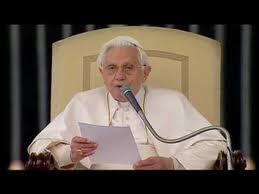“Today we all run the risk of living as if God did not exist”. The Pope made this extempore speech at the end of today’s general audience catechesis in front of approximately 25,000 faithful. The catechesis was dedicated to Blessed Angela of Foligno, “a great medieval mystic who lived in the 13th century”. “But God – Benedict XVI continued extempore – can make Himself present in our souls, show us that He exists, and that He knows and loves us, in hundreds of ways, a way that is different for everyone. Angela wants us to become aware of the presence of God, so that we learn the way with God and to God”. Blessed Angela of Foligno, recalled the Pope, “was initially distant from God and from Christ, but then the encounter with the figure of St. Francis awakened her soul” because she understood “that only in God life becomes true life”. “Let us pray to the Lord – concluded the Pontiff, always speaking extempore – that He will make us aware of the signs of His presence and teach us how to truly live”.
“To be absorbed and transformed by the love and suffering of the Crucified Christ, identifying ourselves with Him”. The Pope summed up in these words the “lesson” of Angela of Foligno, who after a “carefree life” – said the Pope reflecting on her biography – “embraces conversion when she realises in her soul that the forgiveness of God is a free gift of love from the Father”. “No one can make excuses, for each of us can love God”, the Blessed wrote. “In her spiritual journey, Angela moves from conversion to the mystical experience, from the expressible to the inexpressible, through the Crucified”, who “becomes her teacher of perfection”. “Her entire mystical experience” is therefore aimed at “attaining a perfect likeness to God, through purification and through an ever deeper and radical transformation. Angela devoted herself completely, body and soul, to achieving this marvellous goal, sparing no effort, enduring suffering and tribulations from the beginning to the end, with the desire to die amidst all the pains suffered by the God-Man, so as to be totally transformed in Him”. For the Blessed, this “identification” “also implies living what Jesus has lived: poverty, scorn, pain”. “This is the unstable equilibrium between love and pain” towards that “perfection” which enables us to move from the “way of the cross” to the “way of love”.





